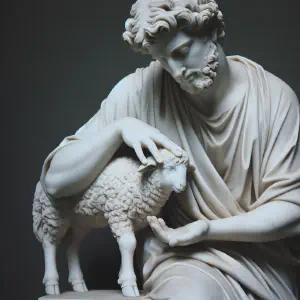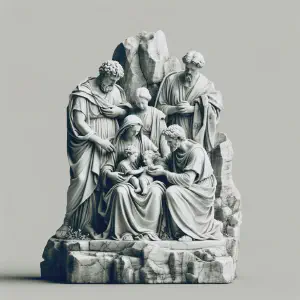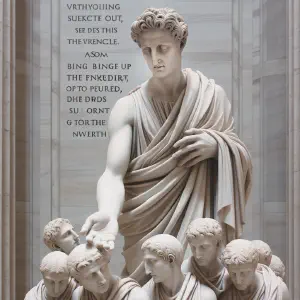The Shepherd's Promise
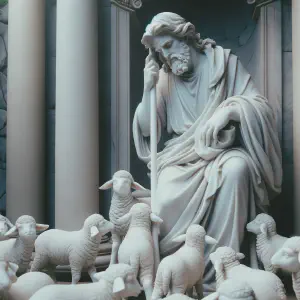
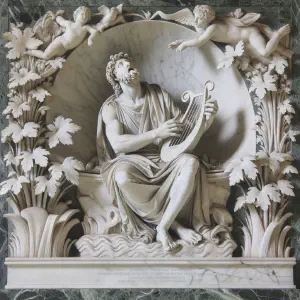
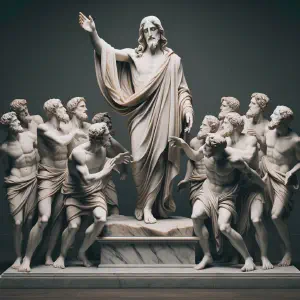
In the final revelation, Jesus, the Son of Man, spoke of His glorious return, when He would separate the people as a shepherd separates sheep from goats. To those on His right, He promised the kingdom, for they had served Him in serving the least of their brothers and sisters. To those on His left, He foretold a different fate, for in neglecting the needy, they had neglected Him. Thus, the righteous were called to eternal life, while the others were destined for eternal separation, fulfilling the shepherd’s ultimate judgment.
Five Questions
What does the imagery of God as a shepherd in Ezekiel and the Psalms tell us about His relationship with humanity?
The shepherd imagery beautifully illustrates God’s nurturing and protective relationship with humanity. In these scriptures, God is portrayed as a caring shepherd who actively seeks out the lost, heals the injured, and guides His flock to safety and rest. This reflects God’s deep compassion, commitment to our well-being, and His proactive role in our lives.
How does the concept of judgment, as seen in Ezekiel and Matthew, align with the theme of God’s mercy?
Judgment, in these texts, is intertwined with God’s mercy. In Ezekiel, God’s judgment is about righting wrongs and restoring order, focusing on caring for those neglected or mistreated. In Matthew, the judgment is based on acts of kindness towards the marginalized, indicating that mercy towards others is a reflection of our relationship with God. Thus, God’s judgment is not just punitive but also a manifestation of His merciful nature.
Can you explain the significance of Christ being the ‘firstfruits’ as mentioned in Corinthians?
The term ‘firstfruits’ signifies the first portion of a harvest, symbolizing the beginning and the promise of more to come. In referring to Christ as the ‘firstfruits’, it underscores His role in the resurrection. Just as the firstfruits are a promise of the harvest to follow, Christ’s resurrection is a promise of our own resurrection and eternal life. It’s a pivotal concept affirming the hope and assurance in Christian faith.
How does Psalm 23 complement the messages in the other readings?
Psalm 23 complements the other readings by reinforcing the theme of God’s protective and providential care. It echoes the shepherd motif, emphasizing God’s guidance, provision, and protection. The psalm assures us of God’s presence even in adversity, paralleling the messages of hope, sustenance, and divine oversight seen in the other scriptures.
In Matthew 25, how does Jesus’ teaching about the sheep and the goats challenge Christians today?
Jesus’ teaching about the sheep and the goats serves as a powerful moral and spiritual challenge. It calls Christians to see Christ in every person, especially the marginalized and needy. The criteria for judgment based on acts of compassion and service to others emphasize that faith is not just a personal relationship with God but also expressed through our actions towards others. This teaching challenges Christians to live out their faith actively in service and love.
Bible Study
Ezekiel 34:11-12, 15-17
Thus says the Lord GOD:
I myself will look after and tend my sheep.
As a shepherd tends his flock
when he finds himself among his scattered sheep,
so will I tend my sheep.
I will rescue them from every place where they were scattered
when it was cloudy and dark.
I myself will pasture my sheep;
I myself will give them rest, says the Lord GOD.
The lost I will seek out,
the strayed I will bring back,
the injured I will bind up,
the sick I will heal,
but the sleek and the strong I will destroy,
shepherding them rightly.
As for you, my sheep, says the Lord GOD,
I will judge between one sheep and another,
between rams and goats.
This passage features God as the shepherd, a role highlighting His protective and nurturing nature. Ezekiel, a prophet in Israel, conveys God’s promise to personally care for and guide His people, symbolizing His omnipotence and mercy. The act of seeking the lost and healing the injured aligns with Catholic values of compassion and the spiritual works of mercy. The judgment between sheep symbolizes God’s discernment and justice, in line with Catholic teachings on divine judgment and moral responsibility.
Psalm 23:1-2, 2-3, 5-6
R. (1) The Lord is my shepherd; there is nothing I shall want.
The LORD is my shepherd; I shall not want.
In verdant pastures he gives me repose.
R. The Lord is my shepherd; there is nothing I shall want.
Beside restful waters he leads me;
he refreshes my soul.
He guides me in right paths
for his name’s sake.
R. The Lord is my shepherd; there is nothing I shall want.
You spread the table before me
in the sight of my foes;
you anoint my head with oil;
my cup overflows.
R. The Lord is my shepherd; there is nothing I shall want.
Only goodness and kindness follow me
all the days of my life;
and I shall dwell in the house of the LORD
for years to come.
R. The Lord is my shepherd; there is nothing I shall want.
Authored by King David, a central figure in Jewish and Christian traditions, this Psalm depicts God as a shepherd who provides and cares for His flock. David’s life, marked by both sin and a heart for God, reflects the human experience of divine grace. The Psalm’s emphasis on God’s guidance and providence resonates with Catholic teachings on God’s sustaining grace and the importance of trusting in divine providence. The imagery of a bountiful table and anointing also aligns with the sacramental life in Catholicism, particularly the Eucharist.
1 Corinthians 15:20-26, 28
Brothers and sisters:
Christ has been raised from the dead,
the firstfruits of those who have fallen asleep.
For since death came through man,
the resurrection of the dead came also through man.
For just as in Adam all die,
so too in Christ shall all be brought to life,
but each one in proper order:
Christ the firstfruits;
then, at his coming, those who belong to Christ;
then comes the end,
when he hands over the kingdom to his God and Father,
when he has destroyed every sovereignty
and every authority and power.
For he must reign until he has put all his enemies under his feet.
The last enemy to be destroyed is death.
When everything is subjected to him,
then the Son himself will also be subjected
to the one who subjected everything to him,
so that God may be all in all.
Paul the Apostle, a key figure in the spread of early Christianity, addresses the resurrection of Christ and its implications for humanity. Christ, referred to as the ‘firstfruits,’ signifies the beginning of a new life beyond death, aligning with Catholic doctrines of resurrection and eternal life. The passage’s focus on Christ’s victory over death and sin reflects Catholic beliefs in Christ’s salvific role and the redemptive nature of His sacrifice, resonating with the concepts of grace and redemption in Catholic theology.
Matthew 25:31-46
Jesus said to his disciples:
“When the Son of Man comes in his glory,
and all the angels with him,
he will sit upon his glorious throne,
and all the nations will be assembled before him.
And he will separate them one from another,
as a shepherd separates the sheep from the goats.
He will place the sheep on his right and the goats on his left.
Then the king will say to those on his right,
‘Come, you who are blessed by my Father.
Inherit the kingdom prepared for you from the foundation of the world.
For I was hungry and you gave me food,
I was thirsty and you gave me drink,
a stranger and you welcomed me,
naked and you clothed me,
ill and you cared for me,
in prison and you visited me.’
Then the righteous will answer him and say,
‘Lord, when did we see you hungry and feed you,
or thirsty and give you drink?
When did we see you a stranger and welcome you,
or naked and clothe you?
When did we see you ill or in prison, and visit you?’
And the king will say to them in reply,
‘Amen, I say to you, whatever you did
for one of the least brothers of mine, you did for me.’
Then he will say to those on his left,
‘Depart from me, you accursed,
into the eternal fire prepared for the devil and his angels.
For I was hungry and you gave me no food,
I was thirsty and you gave me no drink,
a stranger and you gave me no welcome,
naked and you gave me no clothing,
ill and in prison, and you did not care for me.’
Then they will answer and say,
‘Lord, when did we see you hungry or thirsty
or a stranger or naked or ill or in prison,
and not minister to your needs?’
He will answer them, ‘Amen, I say to you,
what you did not do for one of these least ones,
you did not do for me.’
And these will go off to eternal punishment,
but the righteous to eternal life.”
This passage features Jesus Christ, the central figure of Christianity, teaching about the final judgment. The separation of the sheep and the goats represents the discernment of righteous actions, emphasizing the Catholic principles of social justice and the Corporal Works of Mercy. Christ’s identification with the needy and marginalized aligns with Catholic teachings on the dignity of every person and the call to see Christ in others. The passage underscores the importance of active faith expressed through works, a key aspect of Catholic doctrine on faith and works.
Lessons
The readings convey the profound message of God’s compassionate care and just judgment. Like a shepherd, God seeks and nurtures His flock, guiding and healing them. They emphasize the importance of Christ’s resurrection, marking a victory over death and a promise of eternal life. These passages also teach the significance of service; how acts of kindness to the least among us are acts of love towards God. Finally, they remind us of the eventual judgment, where our actions towards others reflect our faith and love for God.
Meditation Prayer
